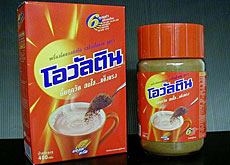icon ovomaltine lives on

Ovomaltine, a symbol of Swiss food, has been in British hands since 2002 although the product is still produced in Switzerland.
Available in more than 100 countries, the drink’s sales have stagnated in Europe but Asian markets are experiencing double-digit growth.
It was in 2002 that the Swiss economy felt the millennium bubble burst. One restructuring followed another, the former Swissair took to the skies again as Swiss, and some well-known Swiss products fell into the hands of foreigners.
But the sale of that most Swiss of brand icons, Ovomaltine, to a foreign company caused the most consternation.
The owner, the global pharmaceutical concern, Novartis, was simply reorganizing its “Nutrition and Health” business unit. It said that “Functional Food” was no longer an integral part of its core business.
The buyer was Associated British Foods (ABF), which paid about
SFr400 million ($329 million) for the brand.
“Ovaltine” had been produced in Britain since 1913 but the English factory shut its doors in 2001 after the drink, popular during the Second World War and the 1950s, started to lose its appeal.
But in some Asian countries Ovomaltine has gone from strength to strength. In Thailand, the malted drink has a market share of 70 per cent.
Betrayal
Many Swiss saw the sale as a betrayal of their homeland. It was little consolation that production remained in Neuenegg near Bern and that the management of the
brand remained in Swiss hands.
But the emotional debate failed to take account of the fact that certain Swiss brands were only marketed worldwide properly when they were taken over by a global company.
Also the trend towards consolidation meant that companies had to concentrate on core competencies, which is exactly what Novartis did when it sold Ovomaltine.
Novartis was created as a pharmaceutical company in 1996 after the merger of Sandoz with Ciba. It was Sandoz that brought the brands Ovomaltine, the chocolate drink Caotina and the isotonic beverage Isostar to the
new company.
An example of successful marketing worldwide is the chocolate Toblerone, combining two important Swiss clichés – chocolate and mountains. Toblerone was sold as early as 1970 to Suchard – now part of the Phillip Morris empire.
Herbal sweet maker Ricola has also managed to make its presence known on the international market and to stay independent, like the soft drinks manufacturer Rivella.
But Rivella has struggled to establish itself internationally – even splurging on expensive promotions has not made it better known outside Switzerland.
swissinfo, Alexander Künzle
Ovomaltine is known in more than 100 countries – 80% of consumption is outside Switzerland.
The soft drink Rivella was unable to establish itself in the United States and Britain.
Toblerone has a huge export presence and thanks to owner Philipp Morris is also known in the US.
The Ricola confectionary firm is a success story, with 80% of its herbal products shipped abroad.

In compliance with the JTI standards
More: SWI swissinfo.ch certified by the Journalism Trust Initiative









You can find an overview of ongoing debates with our journalists here . Please join us!
If you want to start a conversation about a topic raised in this article or want to report factual errors, email us at english@swissinfo.ch.